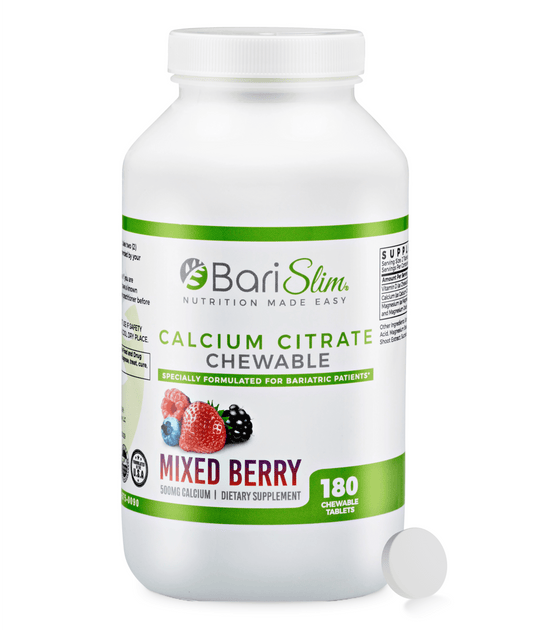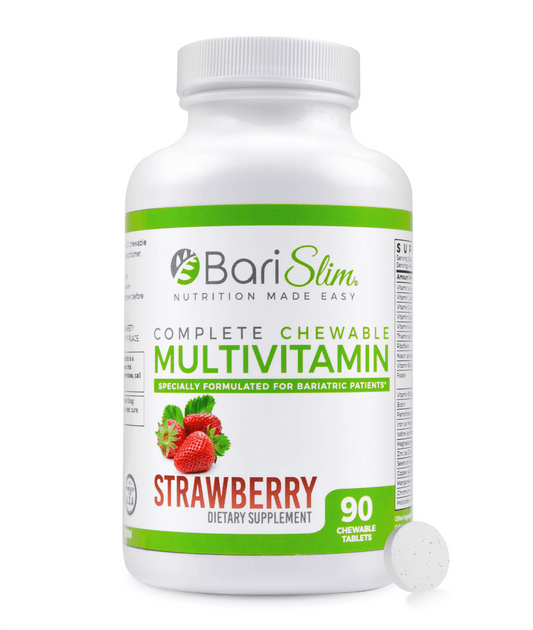Table of Contents
- How Bariatric Vitamins Help Weight Loss
- Daily Bariatric Vitamins Importance After Surgery
- Optimizing Vitamin and Mineral Levels
- The Impact of Deficiencies on Recovery
- The Role of Vitamins in Weight Loss and Fat Reduction
- Bariatric Vitamin Deficiencies & Why That Would Affect Weight Loss
- Targeting Specific Deficiencies
- Maintaining Optimal Health and Metabolism
When considering weight loss options, especially after bariatric surgery, you may wonder about the role of specific vitamins and supplements. It’s important to recognize that bariatric surgery significantly alters your digestive system, which may impact your body's ability to absorb nutrients effectively. Post-surgical nutritional management is crucial, and that's where bariatric vitamins come into play. These specialized formulations are designed to meet your unique nutrient needs and prevent deficiencies that can occur when your diet is restricted and your body is adjusting to a new way of digesting food.
Taking bariatric vitamins is not directly aimed at aiding weight loss but rather at supporting your overall health during your weight loss journey. Following surgery, you are typically placed on a very specific diet that is lower in calories and food quantity to facilitate weight loss. Consequently, you might not be able to consume enough nutrients from food alone. Bariatric-specific multivitamins contain higher levels of certain vitamins and minerals, such as vitamin B12, iron, calcium, and vitamin D, to compensate for the reduced intake and altered absorption.
Good nutrition plays a key role in ensuring successful weight loss and maintaining general wellness after surgery. While the primary purpose of bariatric vitamins is to provide nutritional support and prevent deficiencies, maintaining optimal levels of necessary nutrients can help you feel better overall. This can indirectly support your weight loss efforts by giving you the energy you need to stay active and by supporting your body's normal metabolic processes. Still, it's essential to follow the advice of a healthcare professional who can tailor your supplement regimen to your individual needs following bariatric surgery.
How Bariatric Vitamins Help Weight Loss
After undergoing bariatric surgery, your body undergoes significant changes, especially in how it absorbs nutrients. This is because the procedure alters your stomach's structure, which can lead to nutritional deficiencies. Taking bariatric multivitamins is crucial for maintaining optimal health during your weight loss journey.
- Vitamin D and Minerals: You need higher doses of certain vitamins and minerals, such as Vitamin D, calcium, iron, and B vitamins, to compensate for the reduced absorption capacity of your smaller stomach. Vitamin D, in particular, is essential for bone health and proper immune function.
- Nutrient Absorption: Since your stomach can now hold less food, it is vital to ensure that what you consume is rich in essential nutrients. Bariatric vitamins are specially formulated to be easily absorbed, helping you to get the necessary vitamins and minerals in smaller, more concentrated doses.
- Routine Intake: Establishing a routine for taking your bariatric multivitamin can support weight loss by ensuring that your body is not stressed by nutritional gaps, which can impede your progress and affect overall well-being.
Your intake of these supplements should be in line with your healthcare provider's recommendations, as they will tailor the doses based on your specific needs post-surgery. Regular monitoring and blood tests can help adjust your vitamin regimen for the best outcomes. Remember, while bariatric vitamins play a support role, a balanced diet and lifestyle choices remain central to successful weight loss.
Daily Bariatric Vitamins Importance After Surgery

After bariatric surgery, your body's ability to absorb nutrients is altered, making daily vitamin supplementation critical for your recovery and long-term health.
Optimizing Vitamin and Mineral Levels
Bariatric surgeons emphasize the necessity for a routine intake of vitamins and minerals to compensate for the altered absorption caused by surgeries like the gastric sleeve or gastric bypass. Your small intestine, which is responsible for nutrient absorption, is modified during these procedures, leading to a potential decrease in nutrient uptake.
- Calcium supplements: You should consume calcium citrate rather than other forms, as it's more easily absorbed without stomach acid, which is less available after surgery. Aim for 1,200 to 1,500 mg per day divided into two or three doses to prevent osteoporosis.
- Vitamin D: Essentials for bone health, take at least 3,000 International Units (IU) daily to aid calcium absorption.
- Iron deficiency: Common post-surgery, can lead to fatigue and requires monitoring. An intake of 45 to 60 mg daily is standard, taken separately from calcium for better absorption.
- Thiamine: Required in higher amounts due to reduced storage and increased risk of deficiency post-surgery.
- Vitamin K, Zinc, Copper, and Selenium: These play vital roles in wound healing, immune function, and overall health. Your surgeon will provide a specific dosage guideline.
The Impact of Deficiencies on Recovery
Neglecting the necessary vitamin and mineral supplements post-surgery can lead to serious health complications. Micronutrient deficiencies can manifest in various ways, impacting your recovery process significantly.
- Symptoms to watch for include fatigue, muscle weakness, and neurological issues, which can stem from folate deficiency or lack of other B-vitamins.
- Nutritional deficiencies: May hinder the healing process and increase the risk of infection and prolonged recovery time.
- Osteoporosis and Iron deficiency: Can present with subtle symptoms initially but lead to significant health issues if not addressed promptly.
Adhering to your surgeon's recommended vitamin and mineral regimen ensures successful post-operative recovery and optimal long-term health.
The Role of Vitamins in Weight Loss and Fat Reduction

Vitamins play a crucial role in your body's metabolic processes, directly impacting weight loss and fat reduction. A bariatric dietitian can guide you to incorporate essential vitamins in your diet that help metabolize energy effectively.
Vitamin B12 and B6, for instance, are vital for energy production. A deficiency in these can lead to fatigue and a slower metabolism, hindering your weight loss efforts. Including lean meats, which are rich in B vitamins, could aid in metabolism and promote the use of stored fat as energy.
Vitamin D is another key nutrient; it has been linked to body fat regulation. Your nutrition plan must ensure adequate intake of Vitamin D either through diet or supplements, as it supports hormone balance which can influence body weight.
To facilitate fat reduction, your body requires proper amounts of vitamins to break down lipids and carbohydrates. Nutritionists may recommend increasing sources of lean protein, as they provide essential vitamins and support muscle preservation during weight loss.
Here's a brief breakdown of vitamin sources suitable for a weight loss oriented diet:
- Vitamin B12: Lean meats, fish, dairy products
- Vitamin B6: Chickpeas, bananas, fortified cereals
- Vitamin D: Fatty fish, fortified dairy and orange juice, sunshine
Your bariatric dietitian will likely encourage a balanced diet rich in fruits and vegetables to naturally obtain required vitamins, while potentially advising bariatric-specific multivitamins to ensure gaps are filled. It is important to remember that while vitamins support weight loss and fat reduction, they work best in conjunction with a balanced diet and regular physical activity.
Bariatric Vitamin Deficiencies & Why That Would Affect Weight Loss
Your journey to sustainable weight loss after bariatric surgery can be hindered by nutritional deficiencies as they can affect various bodily functions including metabolism and overall health which are integral to weight management.
Targeting Specific Deficiencies
After bariatric surgery, vitamin deficiencies can be a significant issue due to reduced nutrient absorption. It’s important to address specific deficiencies to ensure your body functions optimally.
- Vitamin D and Calcium: Both are crucial for bone health. The recommended daily allowance for calcium post-surgery is typically 1200-1500 mg, which may be composed of both calcium citrate and calcium carbonate. Vitamin D helps in the absorption of calcium; thus, a deficiency in vitamin D can impact bone density and may lead to conditions like osteoporosis.
- Iron: This mineral is vital for the formation of red blood cells and hemoglobin, which carry oxygen to the tissues. Iron deficiency can lead to anemia, making you feel tired and affecting your weight loss progress.
- Vitamin B12 and Folic Acid: They play a role in immune function and energy production. Since your body may not be able to absorb B12 efficiently after surgery, you may be advised to take it in the form of injections or sublingual pills.
Taking a multivitamin specific to bariatric patients is necessary to counter these deficiencies. These pills typically contain higher levels of certain nutrients like vitamin D and B12, and often come in the form of chewables or liquids for easier absorption.
Maintaining Optimal Health and Metabolism
For substantial weight loss and maintenance, your metabolism must function effectively, which is highly dependent on a balanced intake of essential nutrients.
- Vitamins and Minerals: Adequate levels of vitamins, such as Vitamin E and folic acid, along with minerals, empower the metabolic pathways that convert food into energy, assisting in weight management.
- Calcium Supplements: Beyond bone health, calcium supplements can contribute to weight loss by potentially reducing the amount of fat absorbed by the body. It's key to choose the right form of calcium, such as calcium citrate, which is more easily absorbed post-surgery.
In summary, bariatric patients should be vigilant about their micronutrient intake. Taking bariatric-specific multivitamins can help fulfill the body's altered needs post-surgery, supporting your efforts towards a healthier weight.



 Order Free Sample
Order Free Sample





